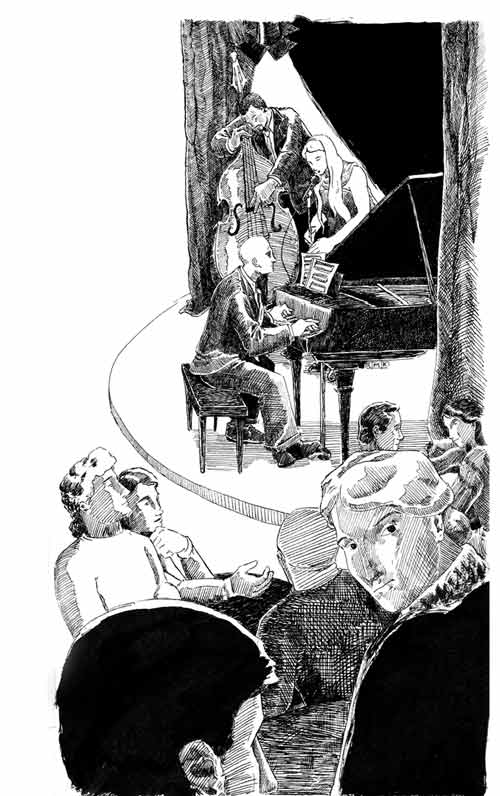
Voices
Botticelli's Mandolin

Drew plays the piano with one hand and I wonder if it's always been like this. With his other hand he taps out the beat to the song playing on Grant's stereo. Someone trips over a guitar case. It has been like this for me for as long as I have known these people. I'm used to it now, and enjoy being a visual artist among musicians. But at times it can be daunting and I often ponder how the greatest painters and sculptors through the ages have reacted to music. I have a postcard-size self-portrait by Botticelli on my bedroom wall. He's the only person in the room who is not smiling. At times I can't blame him.
I have often found myself in an overly crowded room with musicians. I call them musicians because they live for the stuff. They rewind songs to listen to hidden chords that I still can't hear the fourth time around. They fill commercial breaks with solos, and if they don't play it they talk it, and argue it. They buy it and wear it and fall asleep to it. They are music. I have found myself sitting on a pile of other people's coats listening and doing what artists do - watching.
It's 11:30 p.m., and Ryan takes his guitar pick from between his teeth and starts to play; I wonder what Caravaggio would think if he was here. He would know, his friends were musicians. He drank with them, argued with them, and he listened to their music. I wonder if he found himself staring at the ceiling, head propped against a mini fridge, utterly moved by something he could scarcely understand. Master of the visual, perplexed by the invisible. But he pursued it not by painting music, but by painting musicians. They were mostly his own friends, the dark-skinned male tenors who were castrated at an early age so they could keep their high voices with all the power of a male opera singer.
Across from me Ryan works into a lyric. Drew sits on the other side and stares at the corner of the room. They find each other in the same song and someone else joins in. Threats are passed as the guitar case is tripped over again. Erin leans over to give Eliot a kiss on the cheek and I wonder if a sculpture could have been the catalyst of that same kiss. I've thought about it before. I have realized some of the boundaries of my own profession through music and pass all responsibility for such a spontaneous and loving gesture to the musicians. At 12:30 I wonder if Picasso's "Man with Guitar" is sad because he's impoverished or because he's a painting who can't in actuality play his guitar.
Maria lets down her hair and reads the lyrics of a song that I know she knows by heart. Grant turns up the volume and I wonder what Warhol would be thinking. He was among the few who had managed to become a household name within his own lifetime while hardly uttering a word. Granted, he was a cultural oddity and a flashy one at that, but to his credit he earned his 15 minutes through his visuals alone. That is, if you don't consider his almost synonymous connection with The Velvet Underground, Mick Jagger, and David Bowie. The truth is the guy was too clever not to immerse himself in the invisible during a decade driven by musical change, a case of the pioneer of "Pop" using the pop charts. I'm sure he knew the limits of his own profession, as I do now.
Fine art does not translate well over radio or TV. It doesn't annoyingly stick in your head all day long, and you can't enjoy it while driving. It's no wonder there's a contemporary demand for my work to be mechanized, animated, exploded, and double clicked, as if it could possibly compete with the performative aspect of music. Perhaps elements of spontaneity, like sound, are best left to the musicians. Not that an artist can't pursue matters within the sphere of music, or that a musician can't pick up a brush, but for the sake of those who are more sensitive to sight, I think there should be legislation passed prohibiting performers from designing their own album covers. I'm sure a similar request could come from the musician.
At 1:49 a.m., I notice that even a magazine cutout of a Rothko painting looks better while listening to a woman's voice. I wonder if he knew this or even if he was imitating the sound in red and orange. The music stops abruptly and they discuss a wrong note. Someone intentionally kicks the guitar case. Everyone is happy, everyone except Botticelli.
Sometimes when I watch Drew I wonder if he wishes that one note would last forever. That moment, which was so neatly summed up in the one sound, is now over. He'll play it again next week, and Grant will play the song one more time before everyone leaves, and Ryan will again pull out his guitar more excitedly than he is now putting it away. I wonder if they wish they could hold and carry their own work. But that's the nature of music, which so perfectly matches the fleeting nature of our own experiences. The music goes out with the night. I hand them their coats and think what a shame it is that it has to be so quiet.
I stare at Botticelli and he stares back at me. It's a shame that even the best of the musical works in the world don't have that same never-ending icy stare of that man. Maybe he thought that too and that's why he picked up a brush instead of a mandolin.
No one camps out to be the first to get into an exhibition, there are no groupies on tour with sculptors and painters.
|

